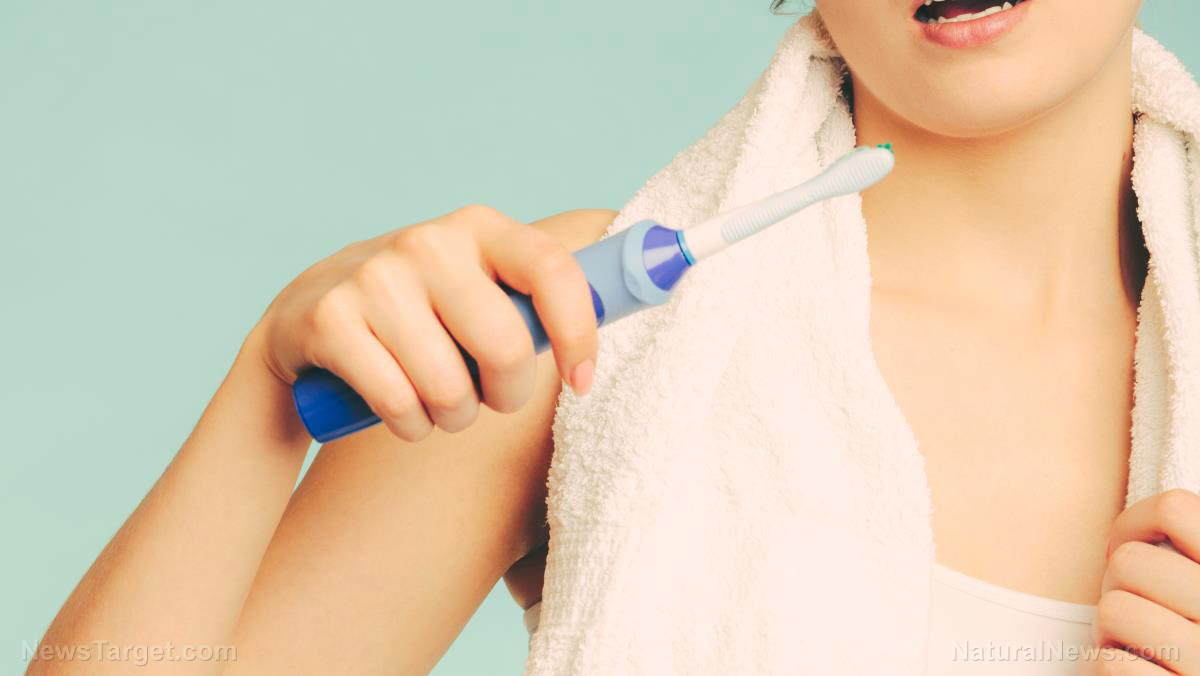Your toothbrush has more bacteria than your toilet
07/30/2018 / By Frances Bloomfield

Your toothbrush could be dirtier than your toilet seat. An infographic by Bath-based bathroom designer, Soakology.co.uk, states that a toilet bowl can contain upwards of 3.2 million bacteria per square inch. However, a toothbrush can contain 200,000 more bacteria per square inch, reports DailyMail.co.uk. The bristles of a single toothbrush can contain millions of microorganisms. Some are harmless but others can be detrimental to your health.
According to a 2012 study published by Nursing Research and Practice, toothbrush storage is crucial to bacteria survival. Most bathrooms are designed in such a way that the toilet is close to the sink, where most toothbrushes are being kept. Every time the toilet is flushed with an open lid, bacteria is released into the air. The bacteria from fecal matter can include Escherichia coli or E. coli, a bacteria most commonly associated with gastrointestinal disease.
The bacteria responsible for tooth decay, Streptococcus mutans, can also live on your toothbrush, states Erin McCarthy on MentalFloss.com. Other notable bacteria that could call your toothbrush home include one linked to tooth decay and cavities, Lactobacillus, and Pseudomonas, a bacteria that causes eye infections. Your toothbrush could even harbor viruses, such as herpes simplex type one which used to be called “oral herpes”. Another virus, Human papillomavirus (HPV), has been connected with oral cancer, cervical cancer, and esophageal cancer. Every time you brush your teeth, you could put yourself at risk of spreading these around your mouth and gums. (Related: The 7 Ugly Truths about Your Toothbrush.)
100% organic essential oil sets now available for your home and personal care, including Rosemary, Oregano, Eucalyptus, Tea Tree, Clary Sage and more, all 100% organic and laboratory tested for safety. A multitude of uses, from stress reduction to topical first aid. See the complete listing here, and help support this news site.
In spite of all these potential health hazards on your toothbrush, simple hygienic practices and habits can decrease your chances of using a bacteria-riddled toothbrush. Brushes with bristles that have become frayed with use should be thrown out and replaced. The American Dental Association (ADA) recommends replacing your toothbrush every three or four months, but you can do this sooner if your toothbrush has begun showing signs of wear.
Storage also plays a big part in keeping your toothbrush safe for use. You should keep your toothbrush far from the toilet and maintain a clean toothbrush holder, one that holds your toothbrush upright rather than lying down. A wet toothbrush encourages bacterial growth. OnHealth.com states that you should allow your toothbrush to thoroughly dry in between brushings. If more than one toothbrush occupies the same toothbrush holder then ensure that the brushes are kept separate to prevent the chances of cross-contamination.
Never interchange toothbrushes as this can result in an exchange of bodily fluids and microorganisms, placing you at the risk of infection. Closing the toilet lid before flushing is one way to decrease the chances of using a toothbrush harboring E. coli; washing your hands before flushing the toilet and before using your toothbrush is another. Carefully rinsing your toothbrush after use removes any remaining food debris and toothpaste.
Take note of the type of toothbrush you use. Dr. Maria Geisinger, Assistant Professor and Periodontist at the University of Alabama at Birmingham, states that toothbrushes with clear or lighter bristles are better than the colored ones. Toothbrushes with clear bristles retain up to 50 percent less bacteria. Geisinger also recommends using toothbrushes with solid plastic handles since these have less spaces for bacteria to hide and germinate in.
Excellent oral care also helps. “Bacteria cause gum disease, and decay, and bad breath,” notes Kimberly Harms, Dentist and Consumer Adviser for the ADA. Rinsing your mouth with a natural antiseptic solution before you brush your teeth can eliminate any bacteria lingering in your mouth before they get to your toothbrush.
You can learn more about oral health by visiting Dentistry.news.
Sources include:
Tagged Under: bacteria on toothbrush, dirty toothbrush, oral care, oral health, oral hygiene, toothbrush




















